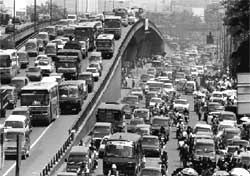In conclusion. Listen to a simple story
 Where citizens living near a highway sued their own government for air pollution. The government was asked to compensate for the health of people.
Where citizens living near a highway sued their own government for air pollution. The government was asked to compensate for the health of people.
In January 2000, in a long-running court battle, Japan's Kobe district court asked the government and the Hanshin Expressway to pay for the health damages to the plaintiffs who were residents of the roadside area of National Highway number 43. While the government was trying to reach an out of court settlement with promises of reducing pollution, in another judgement, the Nagoya district court ordered the Japanese government to pay 18 million yen (US $167,000). Ten companies were also asked to pay the victims of pollution.
Two epidemiological studies came in handy for the citizens. One was a ten-year study by the School of Public Health at Chiba University, which showed that the likelihood of developing asthma was 3.7 times higher than average in boys and 5.9 times higher in girls who lived within 50 metres of busy roads. The researchers attributed the difference to particulates from diesel exhaust.
The second study was by the Environment Agency's National Institute for Environmental Studies (NIES), which found a clear link between diesel particulates and asthmatic symptoms and damage to reproductive organs in mice.
The Japanese case has given a ray of hope for people fighting for clean air. It's a lesson on how the government can be pressured to act. After the Kobe district court order, the Tokyo Metropolitan Government announced the draft regulations for mandatory installment of diesel particulate filters for all diesel vehicles and started negotiating with the major oil companies to supply low sulphur fuels to make the filters work. Even the Japan Automotive Manufacturers Association came forward with the promise that they would fit their vehicles with regenerating particulate traps from 2003-04.
The government-appointed particulate matter risk investigation committee eventually admitted, "We can say that reports strongly show that diesel emissions are carcinogenic."
The people won. Pressure from the people and the judiciary's intervention has helped maintain momentum. The government advanced the emission norms for vehicles by two years and further tightened the norms.
Can India learn?
